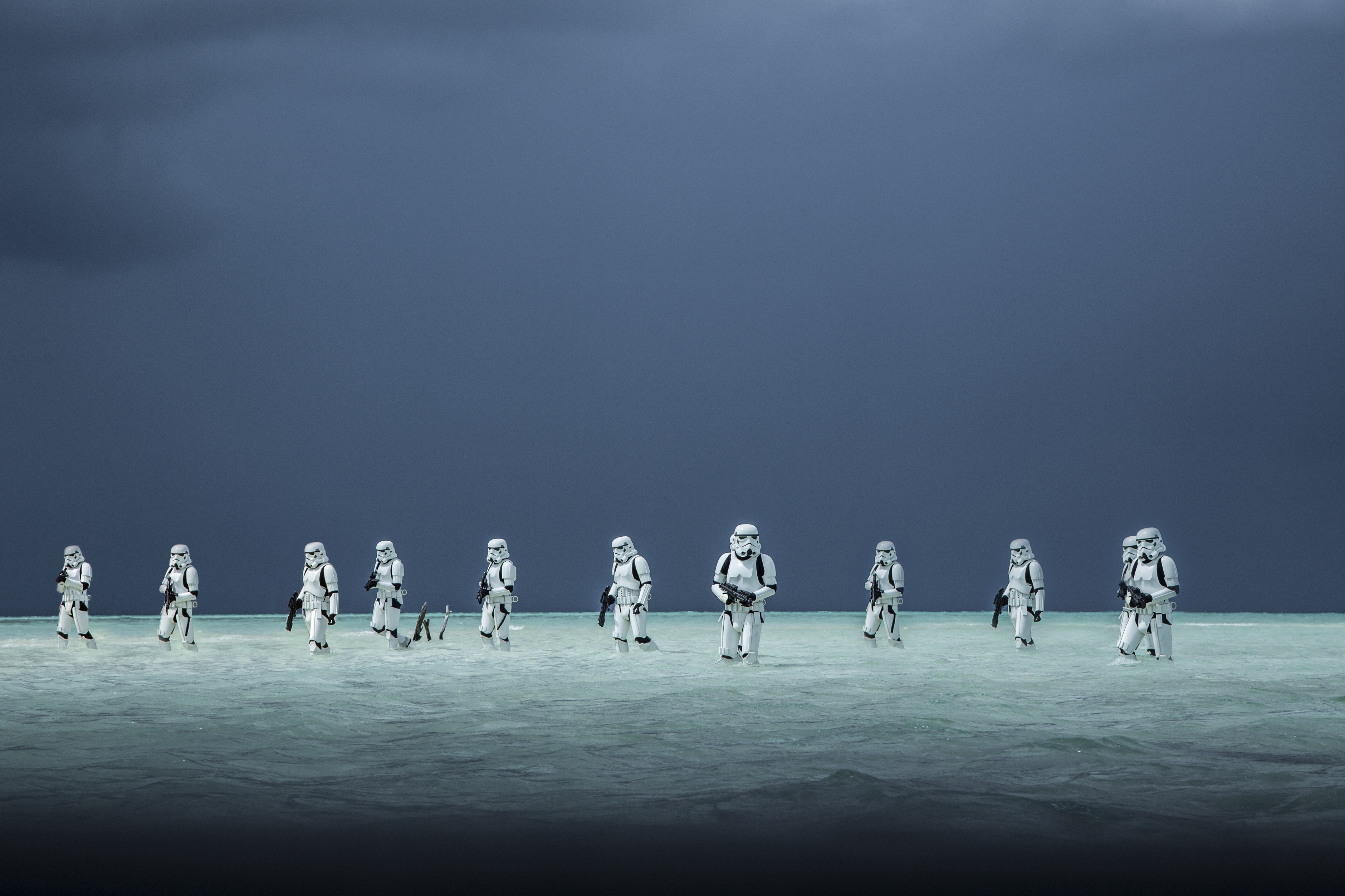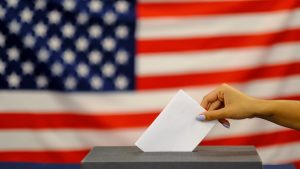
Image credit: Jonathan Olley/Lucasfilm
IT ISN’T OFTEN, in this day and age, that an opportunity to fight actual Nazis presents itself, but you can do exactly that by supporting Rogue One: A Star Wars Story when it hits theaters on December 16. Nearly 40 years after the first film premiered, white supremacists in the U.S. have picked up on the Star Wars franchise’s long tradition of drawing from the Axis of Evil to represent its villains, and they aren’t happy about it. Neo-Nazis have called for boycotts of Rogue One, focusing their ire on the film’s diverse cast, which includes Felicity Jones, Diego Luna, Donnie Yen, and Forrest Whitaker.
In a Reddit post titled “(((Star Wars))) Is Anti-White Social Engineering,” white supremacists waxed poetic on the extent of “SJW propaganda” in creator George Lucas’ iconic franchise, which has been owned by Disney since 2012. The parenthesis, known as “echoes” in the Neo-Nazi community, signify a supposedly Jewish individual or group, or one owned or influenced by Jews. One white nationalist alleged that pitting the predominately non-white Rebels against the whitewashed Galactic Empire “is another Jew masturbation fantasy of anti-white hatred.” Another, who called for a boycott, dragged Star Wars Episode VII: The Force Awakens, saying it “was bad enough featuring that r******d storm trooper N****o and another empowered White female in the lead roles [sic].”
Rogue One writers Chris Weitz and Gary Whitta took to Twitter to “note that the Empire is a white supremacist (human) organization, … [o]pposed by a multicultural group led by brave women.” They quickly deleted their statements, Whitta issued an unnecessary apology, and news outlets — concerned with fairness to the point of normalizing Trump’s cadre — wondered if the tweets would hurt the film’s performance at the box office. Weitz later shared an image of the Rebel Alliance symbol wearing a solidarity safety pin, which remains live at the time of this writing.
Star Wars against hate. Spread it. pic.twitter.com/Dtf5uqpxba
— Chris Weitz (@chrisweitz) November 11, 2016
Of course, most of us didn’t need Star Wars writers to tell us that the conflict between the Rebel Alliance and the Galactic Empire — or the Galactic Republic and the Confederacy of Independent Systems, or the Resistance and the First Order — is, at its core, about a multiracial group of oppressed, brutalized, and ignored people joining forces to take down a fascist regime that rules with an iron fist. If the essential message weren’t clear enough, the franchise’s vocabulary and aesthetic drive the point home. From The Atlantic:
George Lucas wasn’t trying to be subtle when he decided to call the villainous soldiers of his Star Wars series “stormtroopers.” Borrowing the name of the Nazi Party’s original paramilitary wing was one of the many ways Lucas drew clear parallels between that regime and his fictional Imperial Empire (though the Empire could stand in for any totalitarian power, Lucas has noted that its militaristic uniforms were directly inspired by those in Nazi Germany). To reflect the World War II movies of the 1970s, he stocked the Empire with white British actors who curtly barked orders and committed atrocities with stiff upper lips. That symbolism carried over to last year’s Star Wars sequel The Force Awakens, where the Empire’s successor, The First Order, was introduced conducting a rally that looked straight out of Nuremberg.
The Neo-Nazis who are just now feeling outraged at being the villains — both of Star Wars and of history — haven’t been paying attention for the last 40 years. They’ve also provided no explanation for how, if Star Wars is, as one Redditor alleges, “brainwashing kids into hating white men,” they managed to escape Lucas’ supposedly progressive clutches with their racism, nationalism, and toxic masculinity intact. After all, these are individuals who, presumably, grew up watching Star Wars, just like the rest of us.
Disney CEO Bob Iger tells The Hollywood Reporter that Rogue One “is not a film that is, in any way, a political film. There are no political statements in it, at all.” I’ll respectfully disagree. By actively combating unconscious bias and creating a diverse cast of heroes, Disney and Star Wars are making a political statement, albeit a fairly uncontroversial one: that women and people of color are people, and heroic ones, at that.
Similarly, when Lucas modeled his villains on feudal Japan and the Third Reich, he wasn’t being progressive. Remember, this is a guy who told convinced his 19-year-old leading actress to go braless by saying that “there is no underwear in space,” only to later dress her in a metal bikini. Social justice warrior, he ain’t.
However, Lucas was boldly and unashamedly making the statement that Nazis are bad guys — full stop — and that they should be taken out with explosive, physics-defying gusto. Until recently, that wasn’t a political statement, but a simple matter of human decency.
So go see Rogue One: A Star Wars Story, and don’t let the Neo-Nazis grind it down.






-300x169.jpg)


-300x221.jpg)






